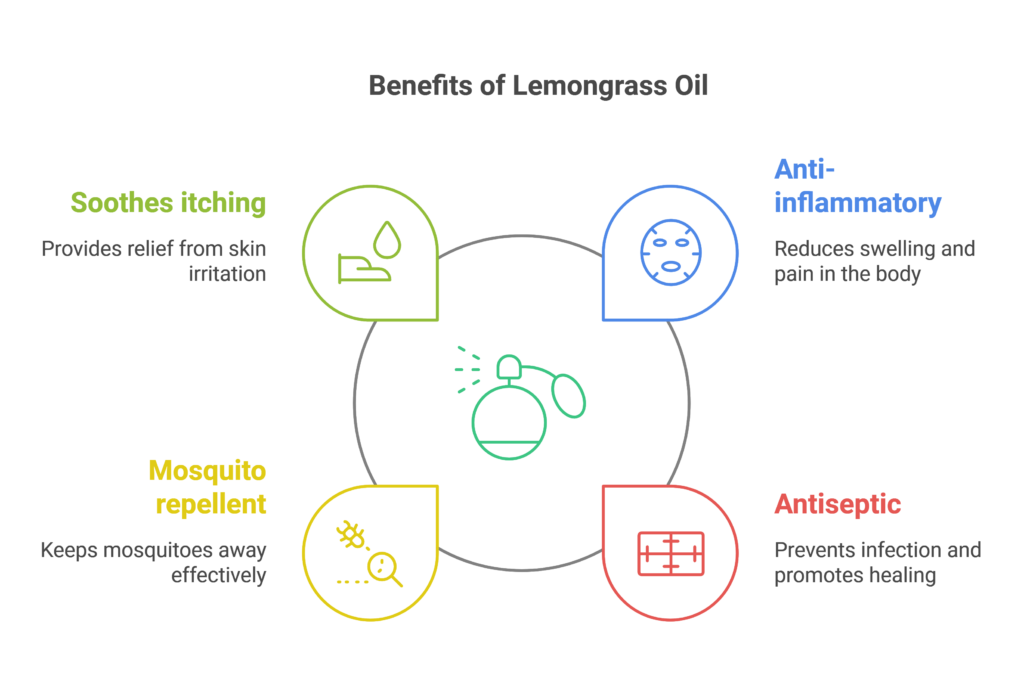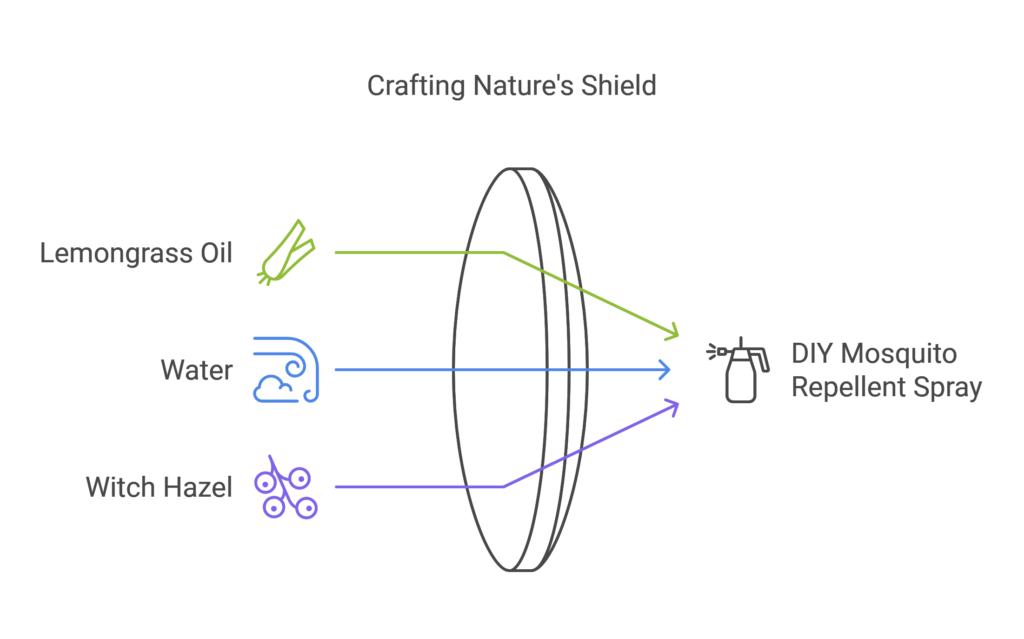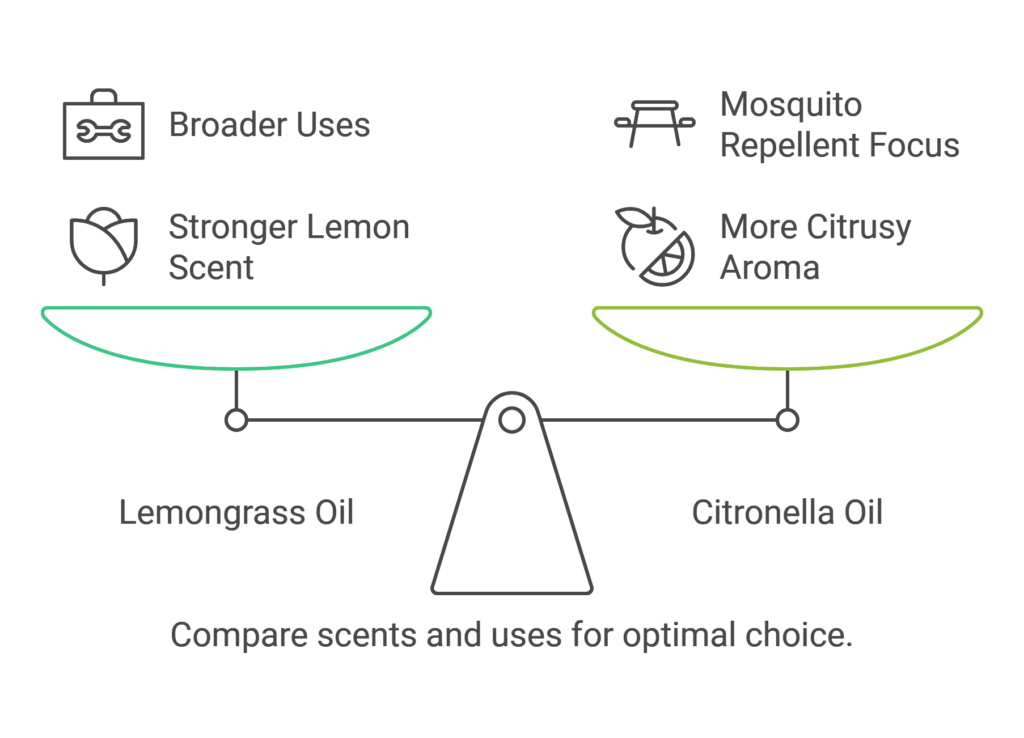A Mosquito Bite Solution Passed Down Through Generations
It can sometimes be incredibly difficult to sit on the balcony and enjoy the city view when you’re constantly distracted by the buzzing sound of mosquitoes around you. Personally, I’m not a fan of using chemical remedies to tackle this issue—I’m uncertain about the potential harm they may cause in the pursuit of comfort.
One of the most well-known ingredients used in my home to control mosquitoes was lemongrass oil. I can still vividly remember its refreshing aroma.
In this blog, we’ll explore the science, application, and broader uses of lemongrass oil to help prevent mosquito bites and soothe the irritation they cause.
The Science Behind How It Prevents Mosquito Bites
Lemongrass oil is extracted from a plant called Cymbopogon, and no—it’s not a combination of lemon and grass (as I mistakenly believed a few years ago). This plant is packed with potent components like citral and geraniol, which contribute to its effectiveness as a natural mosquito remedy.
Key Natural Properties of Lemongrass Oil
- Anti-Inflammatory: Reduces redness, swelling, and irritation caused by mosquito bites.
- Antiseptic: Keeps the bite area clean, preventing infections.
- Cooling Effect: Provides immediate relief from itching and discomfort.
- Mosquito Repellent: Effectively deters mosquitoes, minimizing further bites.

Lemongrass oil has been a part of my family’s natural remedies for generations, and I hope this blog helps you rediscover its benefits too!
Scientific Backing
There are numerous studies and research journals that confirm the anti-inflammatory and antimicrobial properties of lemongrass oil. It has been found to be as efficient as some chemical alternatives but with significantly fewer side effects.
How to Use Lemongrass Oil for Mosquito Bites
Step 1: Choose Your Carrier Oil
For those unfamiliar with lemongrass oil, it is often sold in a highly concentrated form in retail stores. Because of its potency, it’s essential to dilute it with a carrier oil before application.
Here are some commonly used carrier oils:
- Coconut Oil: Provides moisturizing and antimicrobial benefits.
- Jojoba Oil: Perfect for sensitive skin, as it mimics the skin’s natural oils.
- Argan Oil: A great option for oily or acne-prone skin due to its lightweight texture.
Diluting lemongrass oil not only ensures safe application but also enhances its benefits by combining it with the properties of the carrier oil.

Step 2: Prepare and Apply
Take a few drops of lemongrass oil and mix it with 1 teaspoon of your chosen carrier oil.
After cleaning the affected area with soap and water, gently massage the mixture onto the mosquito bite. The soothing properties of the oil will begin to work almost immediately, providing relief from itching and discomfort.
Step 3: Reapply as Needed
There’s no fixed regimen for how often this remedy should be used. However, as a rule of thumb, you can reapply the oil blend whenever there is persistent itching or irritation—up to three times a day for best results.a rule of thumb would be to used, when their is persisitent itching, reapply the oil blend up to three times a day.

Beyond Mosquito Bites: Multipurpose Uses of Lemongrass Oil
Lemongrass oil is versatile and offers numerous benefits:
- Aromatherapy: Diffuse it to alleviate stress and promote relaxation.
- Natural Mosquito Repellent: Mix with water to create a DIY spray for your home or skin.
- Skincare: Use it to soothe acne, fungal infections, or minor skin irritations.
- Digestive Health: Ingestible-grade lemongrass oil (only with proper guidance) may help with bloating and indigestion.
FAQs About Lemongrass Oil
1. Can I use lemongrass oil directly on my skin?
No, always dilute it with a carrier oil to avoid irritation or sensitivity.
2. What’s the difference between lemongrass oil and citronella oil?
While both repel mosquitoes, citronella oil focuses on prevention, whereas lemongrass oil offers additional healing and anti-inflammatory benefits.

3. Can lemongrass oil be used on kids or pets?
Consult a pediatrician or veterinarian before applying lemongrass oil to children or animals, as it can be too potent for them.
When to See a Doctor
While lemongrass oil is effective for mild bites, seek medical attention if you notice:
- Severe swelling or redness.
- Pus, warmth, or other signs of infection.
- Systemic symptoms like fever or difficulty breathing.
Final Thoughts
Lemongrass oil, a remedy celebrated in both traditional wisdom and scientific research, is a safe, natural, and effective solution for mosquito bites. With its anti-inflammatory and antiseptic properties, it not only soothes but also heals. Whether you’re dealing with an itchy bite or seeking a multipurpose oil for your wellness routine, lemongrass oil is a must-have.
Disclaimer
This article is for informational purposes only and does not substitute professional medical advice. Always perform a patch test before use and consult a healthcare provider for specific concerns.










Leave a Reply